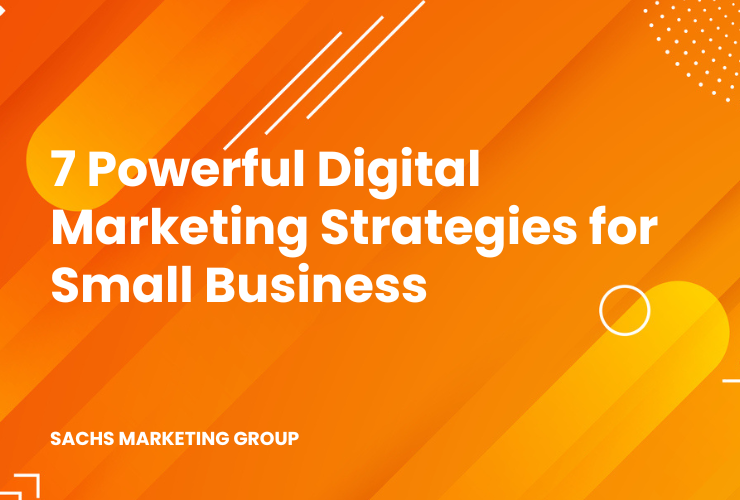Digital marketing strategies for small businesses encompass a range of online marketing techniques and tools to reach and engage a targeted audience. These strategies are vital for small businesses aiming to increase their online visibility, attract new customers, and compete with larger companies.

Many small businesses struggle to establish a strong online presence and compete with larger competitors. This is important because traditional marketing methods might not be enough to reach the modern, web-savvy consumer.
Fortunately, there are digital marketing strategies you can use to increase your visibility, connect with potential customers, and grow your business online.
In this article, we’re sharing seven powerful digital marketing strategies for small businesses, so you understand how you can use digital marketing to grow your business.
Overview
Digital Marketing Strategies for Small Business
In a rapidly evolving digital world, small businesses must adapt and employ strategic approaches to marketing. These strategies are essential for reaching a broader audience, converting leads, and providing competitive advantages in the digital marketplace.
For the best results, using a multi-channel digital marketing strategy will provide the best results by combining multiple strategies.
Here are seven digital marketing strategies for small businesses…
1. Search Engine Optimization
Search Engine Optimization (SEO) is a vital digital marketing strategy aimed at increasing a website’s visibility in search engine results.
Through the optimization of on-page elements, such as keywords, meta tags, and image alt attributes, as well as off-page factors like backlinks, SEO helps websites rank higher in search engine results pages (SERPs).
A well-executed SEO strategy not only drives organic traffic but also enhances the site’s credibility and user experience. By aligning content with search intent and continually monitoring and adjusting to search engine algorithm changes, businesses can achieve long-term success and a competitive edge in the crowded online marketplace.
2. Local SEO
Local Search Engine Optimization (SEO) is a vital digital marketing strategy that helps businesses target potential customers within a specific geographic area.
By optimizing a website with local keywords and listing it on local online directories, businesses can rank higher in local search results. This strategy is especially beneficial for service-oriented businesses. For example, a rehab facility in Malibu, California, might optimize its website with phrases like “Malibu rehab.” By doing so, when local residents search for rehab services in their area, the company’s site would appear in top search results, thereby increasing visibility and attracting more local clients.
3. Social Media Marketing
Social Media Marketing is an indispensable tool for small businesses looking to connect with a broader audience.
By utilizing platforms like Facebook, Instagram, Twitter, and LinkedIn, businesses can engage directly with customers, sharing insights, updates, and special offers. Social media not only facilitates direct communication with potential clients but also provides a space to showcase a brand’s personality and values.
This interactive platform allows customers to feel a connection to the brand, leave feedback, ask questions, and even share content, amplifying the brand’s reach and influence.
4. Pay-Per-Click (PPC) Advertising
Pay-Per-Click (PPC) Advertising is a highly targeted and flexible advertising model that can be incredibly beneficial for small businesses.
By displaying ads to users who are actively searching for related products or services, PPC advertising ensures that promotional efforts are directed toward a relevant audience. Small businesses can set a specific budget, bid for ad placement in search engine sponsored links, and only pay when the ad is clicked, providing control over advertising costs. If you’re running an ecommerce site and want to increase the visibility of your products, you can advertise on platforms like Google Shopping to align your products with people who are actively shopping.
This method also offers valuable insights into ad performance, allowing businesses to analyze and optimize campaigns in real-time. It’s an efficient way to gain immediate visibility and can be a game-changer for businesses aiming to compete with larger competitors in the online marketplace.
5. Content Marketing
Content marketing is an essential digital marketing strategy that revolves around the creation and sharing of valuable and relevant content.
It’s not about pitching your products or services directly but about providing information that educates, entertains, and engages your target audience. By offering content that resonates with your audience’s needs and interests, content marketing aims to build trust and credibility. It enables businesses to position themselves as experts in their field, fostering a relationship with customers that goes beyond mere transactions.
For small businesses, content marketing offers a powerful way to differentiate themselves from competitors and establish a unique voice in the crowded marketplace. Through blogs, videos, infographics, podcasts, and other content forms, small businesses can showcase their expertise and provide solutions to the problems their customers might face.
A few common types of content used in content marketing include the following:
- Blog Posts: Regularly updated blogs provide fresh content that can educate readers, solve problems, and offer insights into industry trends or products. They are crucial for SEO and engagement.
- Videos: Videos are a highly engaging medium that can explain complex topics, demonstrate products, or share customer testimonials. They are particularly effective on social media platforms.
- Infographics: Infographics visualize data or complex information in a way that’s easy to understand. They can make dry statistics or complicated processes more engaging.
- Whitepapers and eBooks: These in-depth pieces of content offer detailed insights or solutions to particular problems. They are often used as lead magnets in B2B marketing.
- Social Media Posts: Regular posts, images, and updates on social media platforms keep followers engaged, share insights, and promote other content or products.
- Podcasts: An increasingly popular format, podcasts offer an audio experience and are great for in-depth discussions on various subjects, interviews with industry leaders, or regular shows on topics related to your industry or products.
Over time, consistent and high-quality content marketing can lead to increased brand loyalty, higher conversion rates, and a more engaged and informed customer base. The personalized touch that content marketing provides helps small businesses connect with their audience on a deeper level, turning prospects into loyal customers.
6. Email Marketing
Email marketing is a powerful digital marketing strategy that allows small businesses to reach their customers directly and in a personalized manner.
By segmenting the audience based on specific criteria, businesses can send targeted messages, promotional offers, newsletters, or product announcements that resonate with individual preferences and needs. It offers a cost-effective method to nurture leads, enhance customer relationships, and drive engagement, by delivering content that is tailored to the interests of the recipients.
What sets email marketing apart from other channels is its ability to foster a one-on-one connection with customers. Well-crafted emails that speak to the reader’s needs and provide valuable information or exclusive offers can build loyalty and trust. It also allows businesses to track open rates, click-through rates, and conversion metrics, providing insights into customer behavior and preferences.
These analytics guide further optimization, ensuring that the email marketing efforts are continually aligned with the business goals, making it a dynamic and flexible tool for small businesses.
7. Reputation Management
Reputation management is a critical aspect of modern business that involves monitoring, nurturing, and controlling the public image of a brand or individual.
Opinions can spread rapidly, and an adverse comment or review can significantly impact a brand’s perception. By actively managing online reviews, engaging with customers, and promoting positive content, reputation management helps in building trust and credibility.
Reputation management isn’t just about damage control but also about showcasing the best aspects of your brand. Utilizing tools and strategies that emphasize customer satisfaction and quality service can create a more positive online presence. By focusing on transparency and customer engagement, and by actively addressing concerns or negative feedback, a company can build a robust and positive online reputation that attracts and retains customers.
Need Help with Your Digital Marketing?
Struggling to stand out in the crowded digital marketplace? Sachs Marketing Group offers comprehensive digital marketing services tailored to your unique business needs.
From SEO and social media marketing to PPC management and reputation management, our dedicated team uses proven strategies to drive traffic and increase conversions, ensuring that your brand reaches its full potential online.
Imagine watching your business grow as your website climbs the search engine ranks, your social media engagement flourishes, and your ROI multiplies. Sachs Marketing Group is committed to turning that vision into reality.
Contact Sachs Marketing Group today to discover how our personalized, results-driven digital marketing solutions can work for you!
Conclusion
Now that you have a few digital marketing strategies for small businesses, you’re ready to implement one or more for your business. Implementing the right digital marketing strategies can transform the way small businesses reach and engage with their customers.
From SEO to content marketing, these strategies offer various avenues to connect with potential customers and build a strong online presence. With the help of a professional digital marketing agency, even small businesses can harness the power of digital marketing to achieve remarkable growth and success.
Contact us today to get the conversation started!













